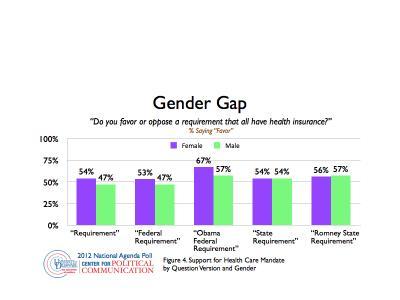As the Supreme Court prepares to issue its ruling on Thursday, Americans are divided along party, ideology and gender lines on a key provision of the healthcare law.
A new National Agenda Opinion Poll by the University of Delaware's Center for Political Communication reveals women are significantly more likely to support health insurance requirements than men. Additionally, Democrats and liberals overwhelmingly favor insurance mandates, whereas large majorities of Republicans and conservatives oppose them.
The national telephone survey of 906 Americans was conducted by the Center for Political Communication from May 20 to June 6. Professors David C. Wilson and Paul Brewer supervised the study. Wilson, the center's coordinator for public opinion initiatives, said "the results suggest President Obama may actually have more political capital for his health insurance requirement than is widely reported."
The survey first asked "Do you favor or oppose a requirement that all people have health insurance?" Pollsters then went on to ask the same question four other ways inserting the terms: federal requirement, state requirement, federal requirement signed by President Barack Obama and state requirement signed by former Massachusetts Governor Mitt Romney.
Gender Gap
Women were significantly more likely to support health insurance requirements than men, particularly at the federal level. Women show their strongest support for a federal health care requirement signed by Obama. They support state level requirements at the same level as men, whether Romney is mentioned or not.

A new National Agenda Opinion Poll by the University of Delaware's Center for Political Communication reveals women are significantly more likely to support health insurance requirements than men.
(Photo Credit: University of Delaware Center for Political Communication)
Brewer, the center's associate director for research, said, "No matter what the Supreme Court does, its ruling will go against the views of a sizable portion of the public. Public opinion about a mandate is deeply polarized along partisan and ideological lines."
Partisan Divide
The versions asking about "a state requirement" (supported by 54 percent) or "the state requirement, signed by former Massachusetts governor Mitt Romney" (supported by 56 percent) received lower support than the federal version mentioning Obama.
A closer look at the results reveals wide gaps between Republicans and Democrats and between liberals and conservatives on all five versions of the question. For each version, support among Democrats and liberals is much greater than support among Republicans and conservatives.
Democrats and liberals are more likely to support a state requirement than a federal requirement, but when Romney's name is mentioned they support a state requirement less. Republicans and conservatives tend to support requirements by Obama and Romney more than the generic idea of a state or federal requirement without a political figure's name attached.
"The findings among Republicans and conservatives suggest they do not draw the same distinction between state and federal mandates that Romney has drawn in his campaign," Wilson said.
Source: University of Delaware